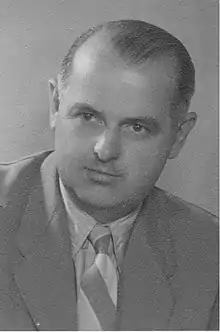Erich Bloedorn | |
|---|---|
 | |
| Born | 6 July 1902 Mühlhausen |
| Died | 30 November 1975 (aged 73) Ansbach |
| Allegiance | |
| Service/ | Reichswehr (1924–1930) Luftwaffe (1936–1945) |
| Years of service | 1924–1930 1936–1945 |
| Rank | Oberst |
| Unit | Kampfgeschwader 4 Kampfgeschwader 30 |
| Commands held | III./KG 4 KG 30 |
| Battles/wars | World War II |
| Awards | Knight's Cross of the Iron Cross |
| Other work | Military advisor to China Military advisor to Turkey |
Erich Bloedorn (6 July 1902 – 30 November 1975) was a German Luftwaffe bomber pilot and recipient of the Knight's Cross of the Iron Cross during World War II. The Knight's Cross of the Iron Cross was awarded to recognise extreme battlefield bravery or successful military leadership.
Life
Bloedorn studied at the University of Königsberg and became a member of the Corps Masovia in summer 1921.[1] In 1924 he gave up studying and joined the Reichswehr in Allenstein, Masuria. When he was lieutenant in the de:2. (Preußisches) Infanterie-Regiment (Reichswehr) in Lötzen he made a bet: to reach Istanbul via Munich within 10 days, alone by motorcycle. He did and the German embassy gave a function.
He retired major from the Reichswehr in 1930 to serve on the General Staff of former Generaloberst Hans von Seeckt, who served as a military advisor to Chiang Kai-shek in Nanking and Shanghai. In 1936 Bloedorn joined the Luftwaffe and served as Hauptmann in Berlin. In 1940 he became Geschwaderkommodore of the Adler-Geschwader which flew air raids in France, the Netherlands, England, Scapa Flow and Norway and sank the Convoy PQ 17.
Having fought in the North African Campaign Bloedorn was promoted Oberstleutnant and assigned to Albert Kesselring in 1943. In Bucharest he witnessed the breakdown of the pro-German Romanian army and the coup of Michael I of Romania. As Oberst he returned to Kesselring until the end of the war. After the war Bloedorn built up a civil existence in publishing of scientific literature. He was married to Dr. med. Ursula Bloedorn. Their daughter Gisa is living in Ansbach, their son Arne in Rheine.
Awards
- Flugzeugführerabzeichen
- Front Flying Clasp of the Luftwaffe
- Iron Cross (1939)
- 2nd Class
- 1st Class
- Knight's Cross of the Iron Cross on 13 October 1940 as Major and Gruppenkommandeur of the III./Kampfgeschwader 4 "General Wever"[2][3]
- German Cross in Gold on 2 September 1942 as Major in Kampfgeschwader 30[4]
References
Citations
- ↑ Jürgen Herrlein, Amella Mai (ed.): Verzeichnis sämtlicher Mitglieder des Corps Masovia 1823 bis 2005. Potsdam 2006.
- ↑ Fellgiebel 2000, p. 135.
- ↑ Scherzer 2007, p. 225.
- ↑ Patzwall & Scherzer 2001, p. 46.
Bibliography
- Fellgiebel, Walther-Peer (2000) [1986]. Die Träger des Ritterkreuzes des Eisernen Kreuzes 1939–1945 — Die Inhaber der höchsten Auszeichnung des Zweiten Weltkrieges aller Wehrmachtteile [The Bearers of the Knight's Cross of the Iron Cross 1939–1945 — The Owners of the Highest Award of the Second World War of all Wehrmacht Branches] (in German). Friedberg, Germany: Podzun-Pallas. ISBN 978-3-7909-0284-6.
- Kaiser, Jochen (2010). Die Ritterkreuzträger der Kampfflieger—Band 1 [The Knight's Cross Bearers of the Bomber Fliers—Volume 1] (in German and English). Bad Zwischenahn, Germany: Luftfahrtverlag-Start. ISBN 978-3-941437-07-4.
- Scherzer, Veit (2007). Die Ritterkreuzträger 1939–1945 Die Inhaber des Ritterkreuzes des Eisernen Kreuzes 1939 von Heer, Luftwaffe, Kriegsmarine, Waffen-SS, Volkssturm sowie mit Deutschland verbündeter Streitkräfte nach den Unterlagen des Bundesarchives [The Knight's Cross Bearers 1939–1945 The Holders of the Knight's Cross of the Iron Cross 1939 by Army, Air Force, Navy, Waffen-SS, Volkssturm and Allied Forces with Germany According to the Documents of the Federal Archives] (in German). Jena, Germany: Scherzers Militaer-Verlag. ISBN 978-3-938845-17-2.